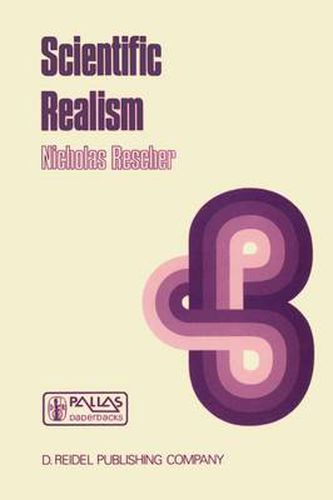Readings Newsletter
Become a Readings Member to make your shopping experience even easier.
Sign in or sign up for free!
You’re not far away from qualifying for FREE standard shipping within Australia
You’ve qualified for FREE standard shipping within Australia
The cart is loading…






This title is printed to order. This book may have been self-published. If so, we cannot guarantee the quality of the content. In the main most books will have gone through the editing process however some may not. We therefore suggest that you be aware of this before ordering this book. If in doubt check either the author or publisher’s details as we are unable to accept any returns unless they are faulty. Please contact us if you have any questions.
The increasingly lively controversy over scientific realism has become one of the principal themes of recent philosophy. 1 In watching this controversy unfold in the rather technical way currently in vogue, it has seemed to me that it would be useful to view these contemporary disputes against the background of such older epistemological issues as fallibilism, scepticism, relativism, and the traditional realism/idealism debate. This, then, is the object of the present book, which will recon sider the newer concerns about scientific realism in the context of these older philosophical themes. Historically, realism concerns itself with the real existence of things that do not meet the eye - with suprasensible entities that lie beyond the reach of human perception. In medieval times, discussions about realism focused upon universals. Recognizing that there are physical objects such as cats and triangular objects and red tomatoes, the medievels debated whether such abstract objects as cathood and triangularity and redness also exist by way of having a reality indepen dent of the concretely real things that exhibit them. Three fundamen tally different positions were defended: (1) Nominalism. Abstracta have no independent existence as such: they only exist in and through the objects that exhibit them. Only particulars (individual substances) exist. Abstract objects are existents in name only, mere thought fictions by whose means we address concrete particular things. (2) Realism. Abstracta have an independent existence as such.
$9.00 standard shipping within Australia
FREE standard shipping within Australia for orders over $100.00
Express & International shipping calculated at checkout
This title is printed to order. This book may have been self-published. If so, we cannot guarantee the quality of the content. In the main most books will have gone through the editing process however some may not. We therefore suggest that you be aware of this before ordering this book. If in doubt check either the author or publisher’s details as we are unable to accept any returns unless they are faulty. Please contact us if you have any questions.
The increasingly lively controversy over scientific realism has become one of the principal themes of recent philosophy. 1 In watching this controversy unfold in the rather technical way currently in vogue, it has seemed to me that it would be useful to view these contemporary disputes against the background of such older epistemological issues as fallibilism, scepticism, relativism, and the traditional realism/idealism debate. This, then, is the object of the present book, which will recon sider the newer concerns about scientific realism in the context of these older philosophical themes. Historically, realism concerns itself with the real existence of things that do not meet the eye - with suprasensible entities that lie beyond the reach of human perception. In medieval times, discussions about realism focused upon universals. Recognizing that there are physical objects such as cats and triangular objects and red tomatoes, the medievels debated whether such abstract objects as cathood and triangularity and redness also exist by way of having a reality indepen dent of the concretely real things that exhibit them. Three fundamen tally different positions were defended: (1) Nominalism. Abstracta have no independent existence as such: they only exist in and through the objects that exhibit them. Only particulars (individual substances) exist. Abstract objects are existents in name only, mere thought fictions by whose means we address concrete particular things. (2) Realism. Abstracta have an independent existence as such.